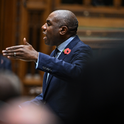In the 1980s and 1990s, the Scots made a bid for greater power within the United Kingdom. That bid has failed.
The bid for power may better be represented as several bids - though these were strongly interlocking, and at times could combine. A sense of grievance was the unifying feature, and this grievance was largely directed at the English. It was combined with a strong sense of superiority - which could, itself, take differing forms, though with a common theme.
Among the most pervasive beliefs was that of moral superiority. It was devoutly believed - an

Moral superiority could and did coexist perfectly well with a desire to remain British. "Here's tae us, wha's like us?" was a toast which could be either grudge-filled or giggling, depending on the speaker or the time, as could the derisive adaptation of the patriotic song, "There'll always be an England," with the second line "As long as Scotland's there." In his oddly titled The Day Britain Died, Andrew Marr writes of what he gathered of the Scots/English relationship as a child in his moderately Conservative, proud-to-be-British, middle-class Scots home - "we Scots lost, but we were nobler and braver and more tragic than the English, who were dull and smug. We were rough, they were smooth. We were gritty, they were suburban."
This harmless self-regard hated Scottish nationalism, in part because nationalism demanded it take its half-serious sentiments fully seriously. If the Scots were uniquely blessed ("wha's like us?"), then why not create a paradise for such creatures? This point was put, with increasing insistence, from the 1970s on until, by the 1980s and early 1990s, it almost monopolised Scots political debate. Nationalism left the cranks' soapboxes, went into the broadcasting studios and took hold of the nation. The meta-narrative provided by Tom Nairn, of a relentlessly declining Britain, played at the back of the national room, like a palm court orchestra. That Nairn, in After Britain, should seize with such gratitude on the Dome as the defining symbol of a government which has been the most economically successful since the 1960s illuminated the frivolity of the approach.
Thus the Scots' bid for power moved in two ways, reflecting the high but contradictory desires of the Scots political class. One was within the Labour party, in whose upper circles the Scots were hugely disproportionately represented - for, apart from their greater moral and political self-confidence, they had withstood the draining of the party by Trotskyism much better than the English, and it had remained a medium for the ambitious.
At the same time, both Scots devolutionary sentiment and Scots nationalism happily insulted the English, and spat on those Scots who still wished to be British. The worst example I know of - but there were thousands - was a poem written by the novelist William McIlvanney, "The Cowardly Lion," (that is, the Scots people) written after the referendum in 1979 failed to mobilise a sufficient vote for devolution. It had these final lines:
…the lion had turned to its cage and slunk away
and lives among the stinking straw today.
Now both of these bids for power have faltered to a stop. The Scots parliament is seen as at best an unpromising start. The less honest of the nationalists claim that this is because it hasn't been given enough power, or that the more formidable individuals in the Scots elite remain seduced by London (as they always have, reasonably, since it is their capital too). And in London, the march of the Scots political class has run into the sand. Donald Dewar died, with at least one of his central projects achieved; Derry Irvine resigned, with no such satisfaction; Robin Cook resigned, with at least the satisfaction of believing himself right - for a man of power, a small comfort. The least regarded have been the efficient and diligent: Alistair Darling, able to manage the long haul of improving transport infrastructure without too many explosions; John Reid, willing to bruise it with the media and wrestle with the NHS while it attempts to prove massive can also be responsive; George Robertson served as an efficient defence secretary, then secretary-general of Nato, and went into boardrooms.
The great politician of his generation has been Gordon Brown. He has had to share power with another great politician, which has manifestly annoyed him, but the combination of these two with other talents has meant that Labour has captured and looks likely to keep the centre of British politics. It has done so through the exercise of economic pragmatism; through moderate Europeanism; through a mix of liberality and boundary-drawing in immigration policy; through public sector-led repair of neglected infrastructures and provisions - and sufficient success in these areas seems likely to sustain a government that will continue to be tested by the long haul to stability in Iraq. Brown should - in both senses of the word - succeed Blair: he has the intellectual and moral force to master and dignify the post.
But this leader of the Scots guard will do so, ironically, by playing down his Scottishness - necessarily, for now it tells against him. A fellow football-father startled me on the touchline last month by saying that "his lot" (Jews) would produce a prime minister before "my lot" (Scots). "People think they've grabbed too much," he said.
The message which increasing numbers of English have taken from the Scots political movement was that the Scots wanted more - from the English. Those of us who disliked the movement did too little to burst its bubble. We have ended up with a so-far mediocre Scottish parliament, and an England resentful at our arrogance. We forgot, or scorned, our joint creation of Britishness: a political-cum-cultural space which we, with others, can comfortably inhabit in different national costumes.










